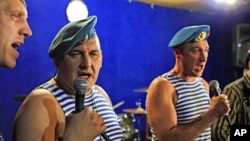Russians again elected Vladimir Putin president on Sunday, but his third term as president promises to be very different than his first two. Russia’s rapidly expanding Internet is piercing Putin’s carefully maintained image as a 21st century czar.
The video starts with a stoic Vladimir Putin sitting inside a steel cage in a courtroom. It is an anti-Putin attack video that has gone viral on Russia’s Internet.
Watched by more than three million people, this 50-second fake news clip shows how nothing is sacred in Russia’s cyberspace.
Russian television and radio journalist Konstantin von Eggert talks about the impact of the Internet.
“It definitely lifts the taboo, that I think has been pretty much already lifted, on this image of an untouchable, omnipotent, knowledgeable leader who always knows best," said von Eggert.
Half of all Russian voters are now on the Internet, a phenomenon that was marginal when Putin left the presidency, in 2008.
Caught off balance, the Kremlin is fighting back in cyberspace. Putin supporters posted this dreamy music video called VVP - the initials of Vladimir Vladimirovich Putin.
Tajik crooner Tolibjon Kurbankhanov sings:
“VVP - he saved the country, VVP - he protects us, VVP - raised up Russia”
Moving from seduction to fear, the Kremlin offered “Russia Without Putin” a nightmare scenario of Russia without a modern day czar.
Playing on Russian insecurities about their vast nation, an announcer spins a vision of a Russia with a weak center: NATO troops occupy Kaliningrad, Russia’s westernmost region, China pushes north and occupies a big chunk of Siberia, and Japan occupies Russia’s Pacific Coast port of Vladivostok. Money printing makes the ruble worthless, electricity is rationed, anarchy reigns in Russian cities.
And at the end, the West responds, it awards opposition leader Alexei Navalny, the Nobel Peace Prize.
Von Eggert sees the Internet freeing Russia’s political debate from half a century of controls imposed by state-television directors.
“The spread of the Internet in Russia undermines the ability of the government to impact the day-to-day agenda and to impose its views," he said.
State television tightly controls discussion of corruption, a leading complaint by Russians today. In contrast, the Internet gives unfettered access to such videos as "The Real Putin."
With a click of a mouse, an Internet visitor gets a tour of palaces and yachts associated with Putin and his circle of friends.
To combat charges that protesters are big city snobs, opposition sites promote this song by two veterans of Russia’s elite paratrooper corps.
They sing of Vladimir Putin: “You are no different from me, a man and not God. I am no different from you, a man, not a sod. We will not let you keep lying. We will not let you keep stealing.”
This May, Vladimir Putin returns to the Kremlin. But thanks to the Internet, his challenge will be to rule a people who are more skeptical, and more informed than ever before.




